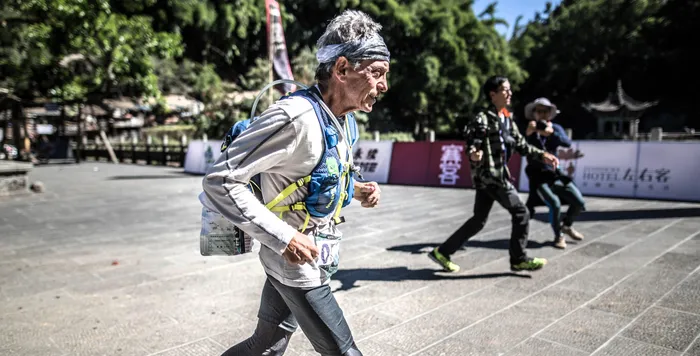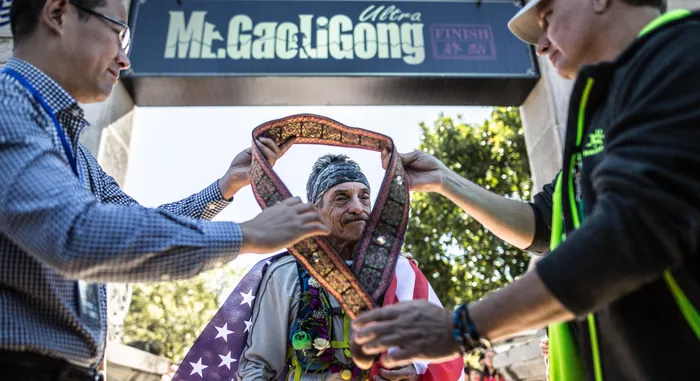
Becker runs the Mount Gaoligong Ultra in southwestern China in November 2016.
Image: Alexis Berg
Kyle Melnick
Bob Becker has long thrived on competition, even in snowball fights as a child. Now that he’s 80, his competitive edge has only gotten sharper.
Even his doctors have taken note.
“Many have said, ‘You’re crazy,’” said Becker, who visits doctors every few months to check on his health. “But they’ve never said don’t [run].”
Becker not only runs grueling ultramarathons - races longer than 26.2 miles that often take days to complete - he also sets records.
“I’ve never really thought of my age as an impediment,” Becker told The Washington Post. “I kind of have the attitude of: If somebody else can do it, you know, why can’t I?”
Case in point: After failing to finish a 135-mile race within the time limit three years ago, and limping across the finish line from cramps, Becker figured he would never accomplish his goal of becoming the event’s oldest finisher. He told fellow racers that he wouldn’t return because, at 77, he didn’t think he would get any faster.

Becker finishes the Mount Gaoligong Ultra in 2016.
Image: Alexis Berg
Yet, last month, Becker stood at the starting line of the same race in eastern California. This time, Becker finished well within the 48-hour time limit despite his fatigued lower back, aching calves and lack of sleep.
It was the latest of the roughly 50 ultramarathons that Becker has completed. He began competing two decades ago, when he wasn’t in the office working as a mortgage broker.
“My introduction [was] totally by circumstance to the world of ultrarunning,” Becker said. “And I absolutely fell in love with it.”
Becker ran the mile competitively for his high school track team but didn’t get into running as an adult until 2002, when his friends invited him to a marathon in Duluth, Minnesota, thinking it would be a fun get-together.
After buying Asics shoes, Becker recalled asking running store employees in Fort Lauderdale, Florida, “What do I do now?” They directed him to a running group. He took to it like a natural.
Becker was pleased with his time of 3 hours, 42 minutes at the Duluth marathon. It also qualified him for the Boston Marathon in April 2003, so he figured he would run that, too. Once he became part of the running community, things took off.
Becker’s friend Jared Knapp asked whether he had heard of Marathon des Sables, an ultramarathon in Morocco. Becker asked what an ultramarathon was. After searching it online, Becker thought it would be a fun way to celebrate his 60th birthday in April 2005.
After competing in the Sahara every day for a week - running between 20 and 50 miles each day - athletes spent nights in tents talking and sharing laughs. Becker fractured his right femur about 115 miles in and later underwent surgery.
But the camaraderie between runners and the beauty of the course had hooked Becker. Following eight months of recovery, he was back at ultramarathon training.
After Becker ran about 100 miles in the Florida Keys in 2007 - taking him roughly 28 hours - he turned the route into an ultramarathon he founded called the KEYS100.
To train for races, Becker ran the steepest incline near his Fort Lauderdale home for more than 20 miles at a time. When he wasn’t near steep hills, Becker simulated them by dragging an SUV tire from a rope tied around his waist - an idea he said was bizarre when an endurance running trainer, Lisa Smith-Batchen, taught it to him. But he bought into the workout after noticing how much it improved his conditioning.
One of Becker’s favorite races came in November 2016, when he ran about 100 miles in southwest China, near the same area his late father, Mickey, fought Japanese soldiers while serving in the U.S. Army Air Corps during World War II.
Becker’s longest race came in the summer of 2019, when he ran 230 miles in 74 hours to break a mileage record at an ultramarathon in Manchester, Tennessee.
Becker has received attention for his rare feats for years, appearing in Trail Runner Magazine in 2017 and Runner’s World magazine two years later.
Inspiring other runners keeps him going, he said.
Once, after finishing an ultramarathon in California, a stranger handed Becker a note that said: “I have been looking for some reason to stay alive. As I watch you make it up the hill I told God if you made it to the finish line I promised to live 100 more days. Then take it from there.”
As he has aged, Becker has adapted his training to stay healthy. He used to run hilly courses often, but he said sprinting down cliffs became “a disaster waiting to happen.” He lowered his mileage and walked long portions of courses. He focused on strengthening his core and practicing balance with one-legged squats, planks and crunches.
Three years ago, Becker switched to a vegan diet to lower his cholesterol and now focuses on eating vegetables, fruit, whole-grain bread and peanut butter. He sees his primary doctor every six months and routinely visits cardiologists, pulmonologists and dermatologists. Some doctors have told him his body is in similar condition to a 60- or 70-year-old, Becker said.
In July 2022, Becker ran the Badwater Ultramarathon, which starts at eastern California’s Badwater Basin, the lowest point in North America, and ends 135 miles later at Whitney Portal, which leads to Mount Whitney, the highest point in the contiguous United States. He crawled some of the last mile - all uphill - and finished about 17 minutes over the 48-hour time limit.
He continued training, and in November, he finished a 140-mile race in Arizona in 54 hours and 22 minutes. That gave him confidence that he could still become the oldest finisher at the Badwater Ultramarathon, which runners consider one of the world’s hardest footraces.
Becker spent hours in a sauna to become accustomed to Death Valley’s temperatures, around 115 degrees. Inspired that Becker was returning to the Badwater Ultramarathon, his trainer, Smith-Batchen, made blue hats that say, “Be like Bob,” inside a white heart.
Smith-Batchen and three of Becker’s friends followed him during the July race in a black Cadillac Escalade, giving him energy gels, milk chocolate-flavored Ensure and iced bandannas, and spraying cold water onto his back. Becker took two breaks about 24 hours into the race to nap in the air-conditioned SUV for about an hour. He crossed the finish line to applause in just over 45 hours.
During the race’s last few miles, Becker told Smith-Batchen it would be his last ultramarathon. He has told her that multiple times over the past few years before finding another challenge.
Becker hasn’t scheduled another race - he’s spending time with his wife, Suzanne - but Smith-Batchen said he will probably find one soon.
“He’s still discovering what he’s capable of,” Smith-Batchen said. “He’s showing what’s possible not just for him, but for you too, for me, for all of us.”